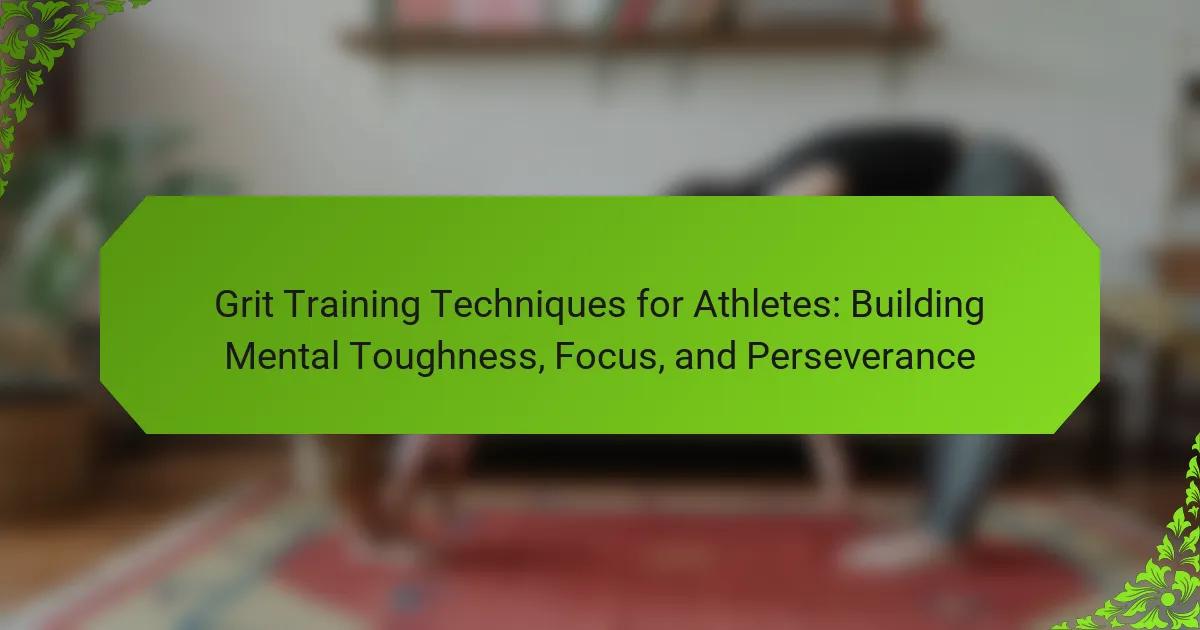Enhancing athletic grit is crucial for amateur athletes seeking to improve their performance and resilience. This article explores practices to build mental toughness, maintain focus, and ensure consistency. Key strategies include goal-setting, mindfulness techniques, and structured training plans. By adopting these methods, athletes can overcome challenges and achieve their objectives more effectively.

What is Athletic Grit and Why Does It Matter for Amateur Athletes?
Athletic grit is essential for amateur athletes as it fosters mental toughness, focus, and consistency. These traits help athletes persevere through challenges and improve performance. Developing athletic grit can lead to increased resilience, enabling athletes to overcome setbacks and maintain motivation. Research indicates that grit is a significant predictor of success in sports, highlighting its importance for those at the amateur level. By cultivating mental toughness, athletes can enhance their training routines and achieve their goals more effectively.
How does mental toughness contribute to athletic performance?
Mental toughness significantly enhances athletic performance by fostering resilience, focus, and consistency. Athletes with strong mental toughness can better manage stress, maintain concentration under pressure, and persist through challenges. This psychological fortitude leads to improved decision-making and execution during competitions. Research indicates that mentally tough athletes often outperform their peers, demonstrating unique attributes such as higher motivation and commitment levels. As a result, developing mental toughness is crucial for amateur athletes seeking to elevate their performance.
What role does focus play in achieving athletic goals?
Focus is crucial for achieving athletic goals as it enhances performance and consistency. Maintaining concentration allows athletes to push through challenges and distractions. Research indicates that focused athletes exhibit higher levels of grit, which correlates with better outcomes in training and competition. Techniques such as mindfulness and visualization can significantly improve focus, leading to more effective practice sessions and competitive performances. By prioritising focus, amateur athletes can maximise their potential and reach their goals more effectively.
Why is consistency crucial for long-term success in sports?
Consistency is vital for long-term success in sports as it builds discipline and resilience. Regular practice fosters mental toughness, allowing athletes to overcome challenges. Consistent training enhances focus, leading to improved performance. Studies show that athletes who maintain a steady routine are more likely to achieve their goals and sustain success over time.

What are the universal practices to build mental toughness?
To build mental toughness, amateur athletes should consistently practice resilience, focus, goal-setting, and self-discipline. These universal practices enhance grit and foster a strong mindset essential for athletic performance.
Resilience involves bouncing back from setbacks, allowing athletes to learn from failures. Focus requires maintaining concentration during training and competition, minimising distractions. Goal-setting provides clear objectives, motivating athletes to push their limits. Self-discipline is crucial for adhering to training regimens and nutrition plans, reinforcing commitment to improvement.
Incorporating these practices into daily routines cultivates mental toughness, leading to greater consistency in performance.
How can visualization techniques enhance mental resilience?
Visualization techniques significantly enhance mental resilience by improving focus and emotional regulation. They allow athletes to mentally rehearse performance scenarios, leading to increased confidence and reduced anxiety. As a result, athletes develop a stronger mental framework to handle challenges. Research indicates that consistent visualization practice can enhance performance metrics, fostering a unique attribute of grit essential for amateur athletes.
What strategies can athletes use to manage stress and anxiety?
Athletes can manage stress and anxiety through mindfulness techniques, structured routines, and goal-setting strategies. Mindfulness practices, such as meditation and deep breathing, enhance focus and reduce anxiety. Establishing consistent training routines fosters a sense of control and predictability, which can alleviate stress. Setting realistic, measurable goals helps maintain motivation and provides a clear path to success, reducing feelings of overwhelm.
How does goal setting impact mental toughness?
Goal setting significantly enhances mental toughness by providing clear objectives and a structured path for athletes. This practice fosters resilience, as athletes learn to navigate challenges and setbacks. By setting specific, measurable, achievable, relevant, and time-bound (SMART) goals, athletes develop focus and commitment. Research indicates that goal-oriented athletes exhibit higher levels of persistence and confidence, crucial components of mental toughness. Additionally, tracking progress towards these goals reinforces a growth mindset, further solidifying mental resilience.

What unique approaches enhance focus for amateur athletes?
Amateur athletes can enhance focus through unique mental strategies. Techniques such as visualization, mindfulness meditation, and goal-setting cultivate mental toughness. Visualization helps athletes mentally rehearse performances, improving concentration during competitions. Mindfulness meditation reduces anxiety, promoting a calm focus. Goal-setting provides clear objectives, enhancing motivation and consistency.
How can mindfulness techniques improve concentration during training?
Mindfulness techniques significantly enhance concentration during training by promoting present-moment awareness. These practices reduce distractions and improve mental clarity, allowing athletes to focus on their performance. Techniques such as breath awareness and body scanning cultivate a deeper connection to physical sensations, which can lead to improved execution of skills. Research indicates that consistent mindfulness practice can increase attention span and resilience, essential components of athletic grit. By integrating mindfulness into training routines, amateur athletes can develop stronger mental toughness and consistency.
What specific drills can help sharpen focus in competitive scenarios?
Drills that sharpen focus in competitive scenarios include visualization exercises, mindfulness training, and situational simulations. Visualization helps athletes mentally rehearse performance, enhancing concentration. Mindfulness training improves awareness and reduces distractions. Situational simulations replicate competitive conditions, fostering focus under pressure. These practices collectively build mental resilience, a unique attribute essential for athletic grit.

What rare but effective practices boost consistency?
Incorporating rare practices can significantly enhance consistency for amateur athletes. One effective approach is visualising success through detailed mental imagery, which strengthens focus and mental resilience. Another practice is establishing a pre-performance routine that conditions the mind and body for peak performance. Engaging in reflective journaling can also help athletes identify patterns in their training and performance, fostering a growth mindset. Lastly, utilising mindfulness techniques can improve emotional regulation and reduce performance anxiety, leading to greater consistency in athletic endeavours.
How can journaling contribute to maintaining a consistent training regimen?
Journaling can significantly enhance consistency in training regimens by fostering self-reflection and accountability. It allows athletes to track progress, identify patterns, and address challenges. Regular entries can strengthen mental toughness by reinforcing commitment and focus, ultimately leading to improved performance. Research indicates that athletes who journal report higher levels of motivation and clarity regarding their training goals.
What insights can be gained from performance reviews and self-reflection?
Performance reviews and self-reflection provide critical insights into an athlete’s mental toughness, focus, and consistency. They identify strengths and weaknesses, fostering targeted improvement. Regular evaluations enhance self-awareness, enabling athletes to set realistic goals. Analyzing performance data reveals patterns that inform training adjustments. This iterative process builds resilience and commitment, essential for achieving long-term athletic success.

What are the common mistakes amateur athletes make in developing grit?
Amateur athletes often make key mistakes that hinder their development of grit. Common errors include lacking a structured training plan, underestimating the importance of mental resilience, neglecting recovery, and failing to set specific goals.
Without a structured plan, athletes may not consistently challenge themselves. Mental resilience is crucial; athletes often overlook the mental aspect of competition. Recovery is vital for physical and mental health, yet many push through fatigue. Lastly, vague goals can lead to a lack of direction, making it difficult to measure progress and stay motivated.
How can overtraining impact mental toughness and focus?
Overtraining can diminish mental toughness and focus by causing fatigue and stress. This leads to decreased motivation and performance. Athletes may experience anxiety and burnout, hindering their ability to concentrate during training and competition. Monitoring training loads and incorporating recovery strategies can mitigate these effects, enhancing mental resilience.
What misconceptions exist about consistency in training?
Many misconceptions about consistency in training suggest it guarantees immediate results. In reality, consistency builds gradual progress over time. Another myth is that consistency means training every day without rest. Effective training incorporates recovery, allowing the body to adapt and grow stronger. Some believe that consistency only applies to physical workouts, overlooking the importance of mental training. Mental toughness and focus are equally vital for sustained performance. Lastly, a common misconception is that consistency is solely about duration; the quality of training sessions is crucial for development.

What actionable tips can enhance resilience and grit in sports?
To enhance resilience and grit in sports, amateur athletes should adopt consistent mental training, set clear goals, and cultivate a strong support network. Focus on visualization techniques to improve performance under pressure. Regularly practice mindfulness to maintain concentration during competitions. Embrace challenges as opportunities for growth, fostering a positive mindset. Finally, maintain a disciplined training schedule to build consistency and mental toughness.
How can athletes create a supportive environment for growth?
Athletes can create a supportive environment for growth by fostering open communication and encouraging collaboration. Building trust among teammates enhances mental toughness and focus, essential for developing grit. Regular team meetings can facilitate sharing experiences and strategies, promoting a culture of consistency. Additionally, recognising individual progress and celebrating achievements strengthen motivation, reinforcing a positive atmosphere conducive to growth.
What are the best practices for integrating grit-building exercises into training?
Integrating grit-building exercises into training involves consistent practice, setting realistic goals, and fostering a supportive environment. Focus on incremental challenges that push athletes beyond their comfort zones. Incorporate mental visualization techniques to enhance focus and resilience. Regularly assess progress to maintain motivation and accountability. Encourage reflection on experiences to build self-awareness and adaptability.
How can amateur athletes measure their progress in mental toughness and focus?
Amateur athletes can measure their progress in mental toughness and focus through consistent self-assessment and tracking. Utilise tools like journals to log experiences and feelings during training. Set specific, measurable goals for focus and resilience, such as maintaining concentration for longer periods or overcoming distractions. Regularly review performance metrics to identify patterns and improvements. Incorporate mental exercises, such as visualization and mindfulness, and assess their effectiveness. Engage in peer feedback to gain external perspectives on mental performance. This comprehensive approach fosters growth in mental toughness and focus over time.



